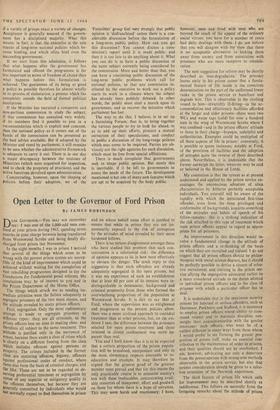Open Letter to the Governor of Ford Prison
By JAMES ROBINSON
DEAR GOVERNOR,—You may not remember me: I was one of the 1,000-odd men con- fined at your prison during 1963, spending seven months in your charge between being transferred from Wormwood ,Scrubs and being finally dis- charged from prison last November.
In the eight months I was in prison I noticed that several of the things which seem to be Wrong with the present prison system are suscep- tible of the kind of improvement which could be achieved without waiting for the completion of Vast rebuilding programmes designed to lay the foundations for fundamental penal reforms. My Conclusions may be of interest to you and to the Prison Department of the Home Office.
The things which struck me as needing im- mediate attention were the failure adequately to segregate prisoners of the two main classes, and the attitude revealed by many prison officers.
First, segregation. Only the most rudimentary attempt is made to segregate prisoners of different types: they are all criminals, as the prison officers lose no time in making clear, and therefore all subject to the same treatment. This attitude is justified only in the narrowest of Senses, because there exists a class of crime which Is clearly on a different footing from the class Which includes offences against persons or Property. The crimes included in the former class are motoring offences, bigamy, offences against professional codes of conduct, where these also form the basis of criminal charges, and the like. These are not to be regarded as de- serving preferential treatment or segregation by virtue of any superior or mitigatory quality in the offences themselves, but because they are generally committed by individuals who would not normally expect to find themselves in prison
and on whose behalf some effort is justified to ensure that while in prison they are not un- necessarily exposed to the risk of corruption by the attitudes of mind revealed by their more hardened fellows.
There is no serious disagreement amongst those who have studied this problem that such con- tamination is a substantial risk : the difference of opinion appears to lie in how most effectively to obviate the danger. The stock reply to this suggestion is that such offenders are already adequately segregated in the open prisons, but it was my experience of such an establishment that at least 60 per cent of its inmates were in- distinguishable in demeanour, background and criminal propensity from those who formed the overwhelming proportion of the population at Wormwood Scrubs. It is fair to say that at Ford, where the supervision was as enlightened and progressive as the present policies allow, there was a more civilised approach to custodial treatment than at other prisons; but, on the evi- dence I saw, the difference between the prisoners selected for Open prison treatment and those retained in closed confinement was more ap- parent than real.
You and I both know that it is to be expected that a certain proportion of the prison popula- tion will be brutalised, unrepentant and only in the most elementary respects amenable to re- education and example. It may therefore be argued that the greatest good of the greatest number must prevail and that for this reason the only practicable course is to minimise society's loss with these ineducables, concentrating avail- able resources of manpower, effort and goodwill on those for whom there is a hope of salvation. This may seem harsh and reactionary; I have,
however, seen and lived with men who are beyond the reach of the appeal of the ordinary social virtues; you have for a number of years had daily dealings with them. I do not believe that you will disagree with my view that there is no acceptable alternative to locking them away from society and from association with prisoners who are more receptive to rehabili- tation.
The next suggestion for reform may be shortly described as `non-degradation.' The prisoner learns early in his prison career that a funda- mental feature of life inside is the conscious determination on the part of the uniformed lower ranks in the prison service to humiliate and degrade him. This is observable in the clothing issued to him—invariably ill-fitting—in the ac- commodation and ablutionary facilities afforded at the larger and older prisons—there were two WCs and water taps (cold) for over a hundred men in the wing of Wormwood Scrubs where I was confined—and in the prison officers' attitude to those in their charge—brusque, unhelpful and authoritarian. Examples could be multiplied of all these aspects of life in prison: conversely, it is possible to quote instances, notably at Ford, of the provision of facilities and the adoption of attitudes quite the reverse of those described above. Nevertheless, it is undeniable that the former outweigh the latter, whatever may be said or believed in the House of Lords.
My contention is that the system as at present understood and applied by the prison service en- courages the unconscious adoption of alien characteristics by hitherto perfectly acceptable individuals. You yourself will be aware of the rapidity with which the uninitiated first-time offender, even from the most privileged and conformable of backgrounds, acquires something of the attitudes and habits of speech of his fellow-inmates: this is a striking indication of the risk attached to this type of treatment which most prison officers appear to regard as appro- priate for all prisoners.
An improvement in this direction would in- volve a fundamental change in the attitude of prison officers and a re-thinking of the 'basis on which they are recruited and trained. I do not suggest that all prison officers should be philan- thropists with social science degrees, but it should be perfectly possible to devise a system of selec- tive recruitment and training in the prison ser- vice allying the segregation advocated earlier to a more considered attitude to the duties allotted to individual prison officers and to the class of prisoner with which a particular officer has to deal.
It is undeniable that in the maximum security prisons for habitual or serious offenders, such as Dartmoor, Parkhurst and Stafford, it is necessary to employ prison officers whose ability to com- mand respect and to maintain discipline out- weighs their acquaintanceship with the gentler emotions: such officers, who must be of a
calibre different in many ways from those whom I would prefer to see forming the greater pro-
portion of prison staff, make an essential Con- tribution to the maintenance of order in prisons, and their qualities should not be overlooked. I am, however, advbeating not only a departure from the preoccupation with strong-arm methods observable in the prison service, but also that serious consideration should be given to a selec- tive extension of the Norwich experiment.
The third feature of prison life which calls for improvement may be described shortly as indifference. This follows on naturally from the foregoing remarks about the attitude of prison
staff. It may not have been as apparent to you,
• as a prison governor, as it is to a prisoner that wide areas of contact between inmates and those in authority are marked by indifference and lack of feeling; it is none the less true that this state of affairs exists. The newly-received, bewildered prisoner may, for instance, find it difficult to ascertain the procedure for securing a special letter or visit for some urgent and perfectly proper reason. Often he receives little assistance on this problem from the prison officers from whom he inquires. Again, when the prisoner is brought into contact with the censor he is often made to feel keenly the indignity of having his letters, and those of his wife or friends, sub- jected to scrutiny by an officer who appears to bring to this task a minimum of tact and sen- sitivity. There should be no need to add to a man's natural concern for the welfare of his wife or of his business or about the progress of his appeal, the additional burden of a lack of understanding of his problem, or of his feel- ings as a husband or father.
This same defect applies equally to the physi- cal aspects of the prisoner's lot. His food, adequate within the limits of the painstaking Home Office regulations governing rations, is often prepared and issued with casual uncon- cern: if he feels unwell or is actually ill he will be regarded as a malingerer and treated accord- ingly until he shows, unmistakable signs of his disability: if he has toothache he must wait— sometimes weeks--until others equally afflicted have been dealt with: if he needs special drugs or items of diet he will be deprived of them until he is able to prove his need.
It is true that none of these attitudes or the resultant difficulties put in the way of the inmate, are insurmountable by men who have the ad-
vantage of an adequate education, and who possess both the necessary persistence and the ability to express themselves in comprehensible terms, but the vast majority are discouraged or inhibited as a result of the prison staff's attitude from making use of the facilities to which they are theoretically entitled.
The reforms advocated here are not intended as an exhaustiye indictment of prison machinery and attitudes: other equally pressing improve- ments will occur to you and to others whose knowledge of the subject is wider than mine. I would not have it thought that I am categorising all prisons as unenlightened snake-pits, all prison officers as brutal, or all prison governors and medical officers as uncaring of their charges. From my own experience at Ford I can testify to the existence of one prison different from that encountered by the vast majority of prisoners. My conclusions about FOrd, however, are that it, and perhaps the other open prisons .(which are `open' in some peculiar' sense comprehensible only to the Home Office—perhaps someone will enlighten me?), are different from closed prisons only in degree, not in kind. This is the fault of the system, not the staff. It is also an indictment
of the society in which we live. . •
Until some progress is made on the lines sug- gested above, injustice will continue to be suffered every day by the most important people in prison—those who may be saved from further terms of imprisonment if treated humanely and permitted to retain their dignity as individuals. Your own treatment, sir, of the prisoners in your care was civilised and understanding. I believe this attitude was effective: I hope it may become more widely practised.
Yours sincerely,
JAMES ROBINSON



































 Previous page
Previous page